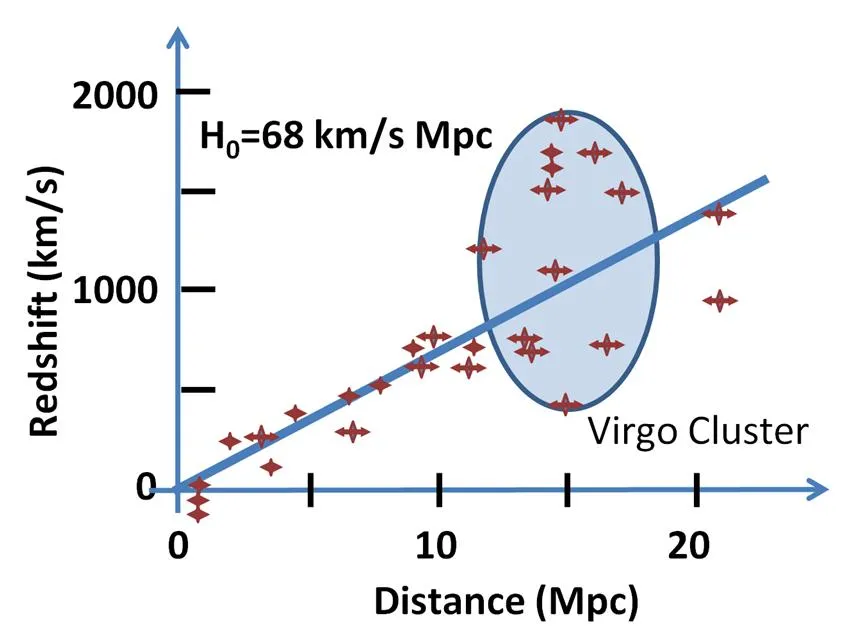In the early 20th century, Edwin Hubble noticed a correlation of redshift per distance in galaxies we observe that became known as Hubble's Law.
From Wikipedia:
"Hubble's law is the name for the observation in physical cosmology that:
Objects observed in deep space (extragalactic space, 10 megaparsecs (Mpc) or more) are found to have a Doppler shift interpretable as relative velocity away from Earth; This Doppler-shift-measured velocity, of various galaxies receding from the Earth, is approximately proportional to their distance from the Earth for galaxies up to a few hundred megaparsecs away.
Hubble's law is considered the first observational basis for the expansion of the universe and today serves as one of the pieces of evidence most often cited in support of the Big Bang model. The motion of astronomical objects due solely to this expansion is known as the Hubble flow."
Source
The actual observation is redshift per distance. Doppler shift is then the assumed cause, as gravitational redshift can also produce such an observation. This is a hugely significant observation because it is the basis for the Big Bang. And it is based on an assumption.
The reason the model later introduced "dark energy" is because Hubble's Law is not even a Law. A law is universal; always applicable. Hubble's "Law" is only within a distance, as even the Big Bang model recognizes, of 10 to 100 Mpc. Shorter distances do not have this same notable linear correlation for all galaxies, and greater distances begin to demonstrate an accelerating rate. This is because Hubble's Law is not a Law. It is simply a correlation that is applicable for a short range of reality.
Yet, even to this day, we still call it "Hubble's Law." Science has lost all semblance of understanding of what a law, fundamentally, is. It is not just some idea that applies for a time. It is UNIVERSAL.
This is a huge red flag that demonstrates how wrong the interpretations are. Because we have assumed that such a "Law" exists, the cause of that "Law" has been assigned to "expansion of space". And then the deviation from that "Law" has simply been written off as the results of some other thing, "dark energy."
It is ludicrous. It is not science, it is a fallacy that is the foundation of the entire way that science still perceives reality.
The reason Hubble's Law is not a Law is because there is no such thing as expansion of space; instead, the observation is actually the result of gravity. This correlation occurs because all distant galaxies are redshifted by an individual object. Shorter distances do not have sufficient exposure to that object, and thereby they do not sufficiently follow the correlation of "Hubble's Law", and therefore they do not match to the correlation. Larger distances are exposed to that object so much that its force of gravity, which is an inverse of radius-squared, begins to show the accelerating rate of redshift per distance that occurs due to such extensive exposure.
Only within a short range do they show a correlation that can be labeled as the linear correlation that came to be known as Hubble's "Law". Outside of that range, the interpretation fails. This is, simply put, because the interpretation is not remotely in line with what is happening.
Light from distant galaxies is gravitationally lensed, bent by the force of gravity, by a singular object. Over great enough distances, this gravitational lensing causes the light to travel in repetitive Figure-8 orbitals. This flow pattern leads to gravitational redshift per distance, and as the light is redshifted the size of the Figure-8 orbital physically gets smaller. Due to a smaller radius, the inverse-radius squared function of gravity begins to show itself more and more drastically as what once appeared linear (Hubble's "Law") becomes noticeably exponential. Not because it is suddenly exponential due to some magical unknown force, but because it always was but within a short enough distance it appears linear. That is how exponentials work.
It's time to take a step back and rethink everything we think we know. The Big Bang did. not. happen. It is rife with flaws and critical holes that are simply ignored or written off with even more extravagant explanations. Maybe, just maybe, it's wrong to its very core. Nothing about it is true. The only thing that is true about it is the observations upon which it bases itself. The interpretations of those observations, though, are completely false. Completely.
